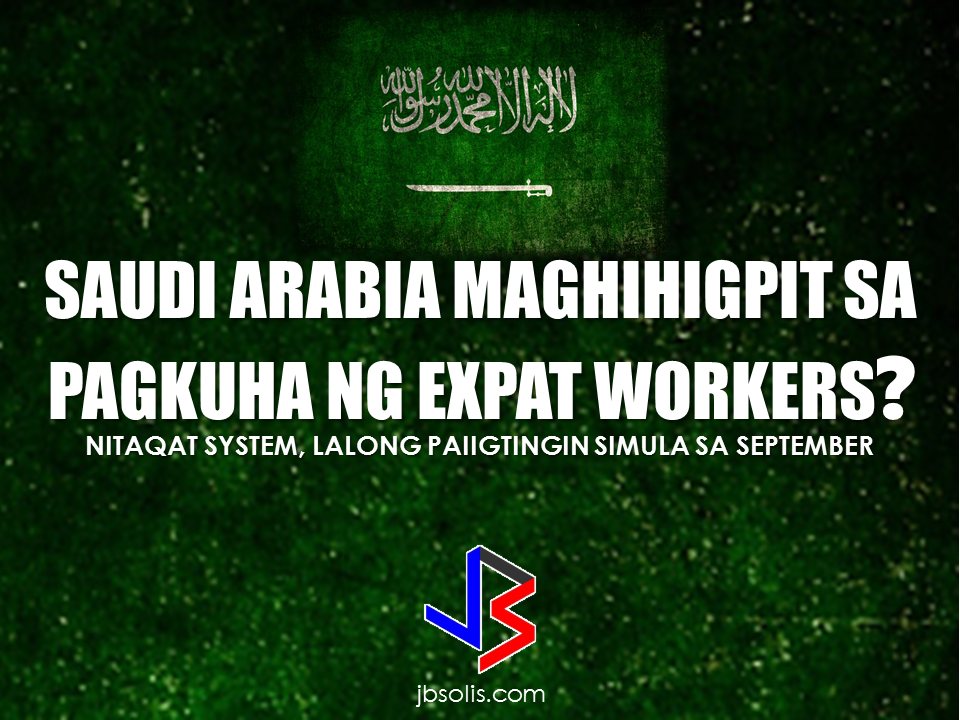The Saudi government implemented the NITAQAT system which aims to reduce the number of unemployment among Saudi citizens due to hiring of expat workers with a great margin of cost to the saudi companies and firms. This coming September, the saudi government will further tighten the hiring of foreign workers to reduce local unemployment rate from the current 12% to the target 9%.
To solve the unemployment problem within the Kingdom, the Saudi government will tighten the hiring of expat workers to force the local companies to hire Saudi locals.
Stricter implementation of the Nitaqat system or Saudization which started last year, (more intense than the implementation at the start of Nitaqat system on 2011), is said to help in economic reforms and solve the growing problem of unemployment among Saudi citizens. The aim is to reduce it from the present 12.1% to 9% by 2020.
The new rule would affect 12 million expats working in the Kingdom including Overseas Filipino Workers (OFWs) which comprises the largest percentage of the total 10 million OFWs worldwide.
Most of them doing the jobs shunned by Saudi locals. Jobs that are more dangerous, harder and has lower salary rate.
Initially implemented on 2011, the Nitaqat System has a grading system based on the companies' local-expat workers ratio. Companies who hire more Saudi locals are favored to hire expat workers and they are more likely to get expat working visa approval easily as they belong to the higher category. The companies which fall to the lower category will be fined.
Construction firms employing between 500 to 2,999 people has to have 100% from the previous 16% employed Saudis to hit the platinum mark, the highest category.To be under green category, they should meet the 10% required ratio from the previously percentage of only 6% .
In the retail sector, big companies with existing rating of 35 % should hit 100%, and the smaller ones with 24% must have 35% rating according to the new policy.
60 industries in Saudi Arabia will be included among sectors that will be hit by the tighten rule.
Presently, there are many Saudi locals that are now working as cashiers and salespersons at the retail shops-- jobs that the locals shunned before. The Kingdom needs more people to work in construction sector but few Saudis are qualified and willing to do the job.
The approval of the stricter policy came from Saudi Labor Minister Ali bin Nasser Al-Ghafis and will be fully implemented starting September 3, 2017.
Sources: Saudia Post, Reuters Africa
In the retail sector, big companies with existing rating of 35 % should hit 100%, and the smaller ones with 24% must have 35% rating according to the new policy.
60 industries in Saudi Arabia will be included among sectors that will be hit by the tighten rule.
Presently, there are many Saudi locals that are now working as cashiers and salespersons at the retail shops-- jobs that the locals shunned before. The Kingdom needs more people to work in construction sector but few Saudis are qualified and willing to do the job.
The approval of the stricter policy came from Saudi Labor Minister Ali bin Nasser Al-Ghafis and will be fully implemented starting September 3, 2017.
Sources: Saudia Post, Reuters Africa
RECOMMENDED POSTS:
2017 Top 10 IDEAS for OFWs to Invest

Before an OFW can return to the Philippines for good, a lot of considerations should be made, one of which is that "If I decided to go home for good, will I be able to sustain my family's financial needs?"Financial stability is one of the reason why the OFWs decided to work abroad. You will often hear most of the OFWs say: "A few more years and I will stop working abroad to be able to be with my beloved family.." Yes, easier said than done. But it can be made possible by proper planning. What you need to do is to think of an investment, a business for example, that you can start to sustain your family that does not require you to work abroad.An ex-OFW who is now a successful businessman in a field he has chosen after working abroad once said that you need to plan for your return for good to the Philippines even before you can actually work abroad. Set your plans and stick to it. Choose a profitable business that suits your talent and resources.

Before an OFW can return to the Philippines for good, a lot of considerations should be made, one of which is that "If I decided to go home for good, will I be able to sustain my family's financial needs?"Financial stability is one of the reason why the OFWs decided to work abroad. You will often hear most of the OFWs say: "A few more years and I will stop working abroad to be able to be with my beloved family.." Yes, easier said than done. But it can be made possible by proper planning. What you need to do is to think of an investment, a business for example, that you can start to sustain your family that does not require you to work abroad.An ex-OFW who is now a successful businessman in a field he has chosen after working abroad once said that you need to plan for your return for good to the Philippines even before you can actually work abroad. Set your plans and stick to it. Choose a profitable business that suits your talent and resources.
©2017 THOUGHTSKOTO
SEARCH JBSOLIS











